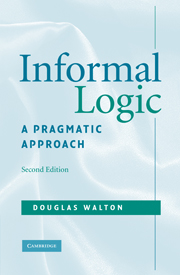Book contents
- Frontmatter
- Contents
- Preface
- Acknowledgments
- Informal Logic
- 1 Argument as reasoned dialogue
- 2 Questions and answers in dialogue
- 3 Criticisms of irrelevance
- 4 Appeals to emotion
- 5 Valid arguments
- 6 Personal attack in argumentation
- 7 Appeals to authority
- 8 Inductive errors, bias, and fallacies
- 9 Natural language argumentation
- Bibliography
- Index
9 - Natural language argumentation
Published online by Cambridge University Press: 05 June 2012
- Frontmatter
- Contents
- Preface
- Acknowledgments
- Informal Logic
- 1 Argument as reasoned dialogue
- 2 Questions and answers in dialogue
- 3 Criticisms of irrelevance
- 4 Appeals to emotion
- 5 Valid arguments
- 6 Personal attack in argumentation
- 7 Appeals to authority
- 8 Inductive errors, bias, and fallacies
- 9 Natural language argumentation
- Bibliography
- Index
Summary
All the arguments and disputes we have been concerned with have been conducted and evaluated in the medium of natural language. But in natural language, words are vague and ambiguous. Words are most often not defined very precisely, and are therefore subject to the interpretation of the disputants in an argument. And since words in an argument may be interpreted in different ways, or according to different standards of precision, they can be used in a fashion that is friendly to the case of the arguer, and unfriendly to the case of the person to whom the argument is directed. Words can be used as weapons in argument.
When an Israeli border town is bombed, the newspapers in Israel describe the event as a terrorist attack, but Arab sources describe the same event as an action taken by freedom fighters in defence of their rights. However, when an Arab city is bombed, its inhabitants describe the event as a terrorist attack, unlike the Israelis, who describe it as a defensive strike against terrorists. The same group of individuals, in each instance, are described as “terrorists” by one side and “freedom fighters” by the other side. Now neither of these contentious terms has been defined, so they are subject to wide and various interpretations in a particular situation. For this reason, it is appropriate to question whether the two terms are being used in such a way that any action by the other side is routinely classified as that of “terrorists,” and any action by one's own side is classified as that of “freedom fighters.”
- Type
- Chapter
- Information
- Informal LogicA Pragmatic Approach, pp. 289 - 332Publisher: Cambridge University PressPrint publication year: 2008



